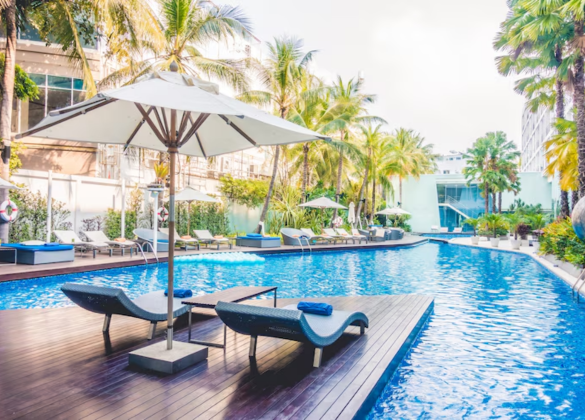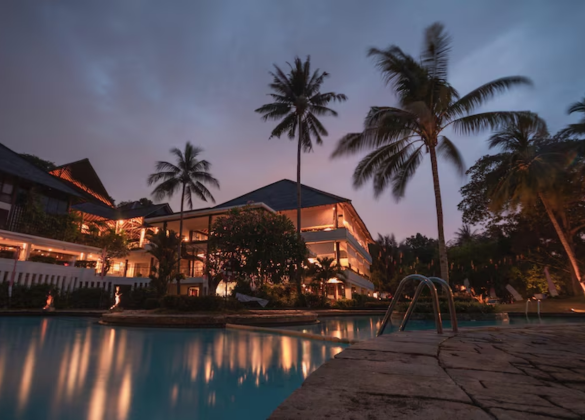Turn Searches into Bookings with Hotel & Resort Local SEO
Potential guests begin their journey to your hotel or resort with a simple search query. With 76% of travelers using search engines to find accommodation and 88% of local business searches on mobile devices resulting in a call or visit within 24 hours, effective local SEO has become the cornerstone of hospitality marketing success.
When travelers search for "hotels near me" or "best resorts in Las Vegas," your property needs to appear prominently in those results to capture these high-intent bookings. This is where Hotel & Resort SEO Services make all the difference in turning casual searches into confirmed reservations.
Media Search Group has over 15 years of experience in the industry and produces compelling, well-researched content that generates results across all U.S. cities, including Las Vegas, Orlando, Chicago, Washington, D.C., New York, Los Angeles, Atlanta, Dallas, Houston, and Phoenix.
What Sets Media Search Group Apart.
- Holistic approach combining technical on-page and strategic off-page optimization
- Transparent and ethical SEO practices
- Proven track record with hospitality clients: 1. Average 300% increase in organic traffic
- Specialized knowledge targeting: 1. Seasonal hospitality keywords
2. Significant improvements in local pack rankings
3. Measurable growth in direct bookings
2. Voice search optimization for travelers
3. Map results optimization for location-based searches
Ready to boost your hotel's visibility to travelers searching in your area?
What Is Hotel & Resort Local SEO?
Local SEO (Search Engine Optimization) is a specialized digital marketing strategy focused on enhancing your hotel or resort's visibility in location-specific search results. Unlike traditional SEO that targets broad, nationwide, or international audiences, local SEO zeroes in on potential guests searching within your geographic area or explicitly including your location in their queries.
These location-based searches typically look like:
- "Luxury resort in Napa Valley"
- "Pet-friendly hotels near me"
- "Affordable stay in downtown Austin"
- "Best boutique hotel in Charleston"
- "Family-friendly resort with pool in Orlando"
The significance of local SEO cannot be overstated in today's digital landscape. According to recent data, over 46% of all Google searches have local intent, and an impressive 76% of mobile users visit a local business within 24 hours of searching. For hotels and resorts, this translates directly to bookings and revenue.
Why Local SEO Matters More Than Ever for Hotels & Resorts
Travelers Trust Search Engines First
The modern traveler's journey almost invariably begins with a search engine. Whether planning a business trip to Manhattan, a romantic getaway to Sedona, or a family vacation to the Florida Keys, potential guests turn to Google before any other platform.
Appearing in the coveted Google Map Pack (also called the Local Pack or Snack Pack) - those prominent top three listings with map results—places your property front and center where it matters most. These prime positions aren't just decorative; they drive results.
Research shows that these top three listings capture between 60% of all clicks for local searches. If your property isn't visible here, you're essentially invisible to the majority of potential guests during their critical decision-making process.
Direct Bookings Mean Higher Profit Margins
Every hotelier understands the financial impact of OTAs (online travel agencies). While these platforms provide visibility, they come at a steep cost, typically 15-30% commission per booking.
Strong local SEO creates a direct channel between your property and potential guests, increasing the likelihood they will book directly through your website. Multiply that across hundreds or thousands of bookings annually, and the financial impact becomes substantial.
Mobile Search Dominates the Travel Industry
The shift to mobile cannot be ignored. As estimated by Statista Market Insights, the United States alone represented over 40 percent of the total value, ranking ahead of China, the second-biggest market based on travel apps' revenue worldwide. These "near me" searches have grown by over 900% in recent years, according to Google.
For hotels, this means that a traveler might be standing on a street corner in your city, tired after a long day, searching for "hotel near me with vacancy." If your local SEO isn't optimized, you'll miss out on these high-intent, ready-to-book guests.
Voice Search Is Changing the Game
With the proliferation of smart speakers and voice assistants, voice search is rapidly transforming how travelers find accommodations. When someone asks Siri, Alexa, or Google Assistant for "the best hotel in downtown Nashville," these platforms typically pull from local search results and provide only the top option. Local SEO ensures you are considered for these increasingly common voice queries.
Core Elements of a Winning Local SEO Strategy for Hotels
Let's examine the foundational elements that transform "searches into bookings" using a comprehensive local SEO approach:
Google Business Profile (GBP): Your Digital Front Desk
Your Google Business Profile (formerly Google My Business) serves as your hotel's digital reception area—often the first impression potential guests will have of your property. This free listing is arguably the most critical element of your local SEO strategy.
Optimization essentials include:
- Complete NAP consistency: Ensure your Name, Address, and Phone number are identical across all online platforms
- High-quality visual content: Upload at least 25-30 professional images showcasing rooms, amenities, common areas, exterior views, and nearby attractions
- Keyword-rich description: Naturally incorporate relevant keywords in your 750-character business description
- Prompt review management: Respond to all reviews within 24-48 hours with personalized replies
- Comprehensive attributes: Include all relevant features like free Wi-Fi, pool access, pet policies, accessibility options, etc.
- Regular posts and updates: Share events, promotions, or property improvements regularly
- FAQ section: Answer common questions before potential guests need to ask them
Pro Tip: Hotels with fully optimized GBP listings receive up to 7 times more clicks and 2.7 times more direct calls than properties with incomplete profiles. According to a BrightLocal study, 49% of businesses receive more than 1,000 views on Google Maps monthly.
On-Page SEO with Localized Intent
Your website needs to communicate your location and local relevance to both search engines and potential guests. This involves strategically incorporating location-specific keywords throughout your site:
For example:
- Page titles: "Luxury Oceanfront Rooms | Seaside Resort & Spa | Miami Beach, FL"
- Meta descriptions: "Experience our award-winning Miami Beach resort with panoramic ocean views, just steps from South Beach's famous attractions. Book direct for best rates."
- H1 and H2 headings: "Experience Luxury at Our Boutique Hotel in Historic Savannah."
- Alt text for images: "Rooftop infinity pool overlooking Central Park at our Manhattan luxury hotel."
- URL structure: yourhotelname.com/charleston-sc-downtown-suite
- Internal linking: Link between pages using descriptive, location-based anchor text.
Most importantly, implement hotel-specific structured data (Schema.org markup) to help search engines understand your business type, location, amenities, rates, and availability. This structured data increases your chances of appearing in rich results and can improve click-through rates.
Create Localized Content That Attracts and Engages
- Area guides: "The Ultimate Guide to Exploring Portland's Pearl District From Our Hotel"
- Seasonal content: "Winter Activities Near Our Aspen Mountain Resort"
- Local expertise: "A Concierge's Guide to Hidden Gems Within Walking Distance of Our Boston Hotel"
- Event calendars: "Upcoming Festivals and Events Near Our San Diego Resort"
- Itinerary suggestions: "The Perfect 3-Day Getaway: Exploring Nashville From Our Downtown Hotel"
- FAQ pages: Address common questions about your location, transportation options, nearby attractions, etc.
High-quality, location-specific content serves multiple purposes: it improves search rankings, builds trust with potential guests, and provides valuable information that influences booking decisions.
Effective content strategies for hotels and resorts include:

This content should be comprehensive, unique, and genuinely useful to travelers. Aim for depth rather than breadth - a detailed 2,000-word guide to your neighborhood will outperform five thin 400-word articles in terms of SEO value and user engagement.
Citations & Directories: Consistent Presence Across the Web
Citations (mentions of your hotel's name, address, and phone number across the internet) send powerful trust signals to search engines. For hotels, this goes beyond general business directories to include industry-specific platforms.
Essential citation sources include:
- Travel platforms: TripAdvisor, Booking.com, Expedia, Hotels.com, Kayak
- General business directories: Yelp, Yellow Pages, Foursquare, Better Business Bureau
- Local sites: Chamber of Commerce, city tourism boards, local business associations
- Maps applications: Apple Maps, Waze, Bing Places
- Social platforms: Facebook, Instagram, Twitter, location data
Discrepancies in your NAP information across these platforms can confuse search engines and potential guests. Use citation management tools like Moz Local, BrightLocal, or Yext to identify and correct inconsistencies.
Reviews: The Social Proof That Drives Bookings
Online reviews influence both search rankings and consumer decisions. According to the latest BrightLocal Consumer Review Survey, 90% of travelers say online reviews impact their booking choices, with 79% trusting online reviews as much as personal recommendations.
Strategic review management includes:
- Systematic collection: Implement a review generation strategy targeting satisfied guests.
- Multi-platform approach: Focus on Google reviews first, but also cultivate reviews on TripAdvisor, Facebook, and OTA platforms.
- Prompt responses: Respond to all reviews—positive and negative—within 24-48 hours.
- Actionable feedback: Use negative reviews to identify and address operational issues.
- Review marketing: Showcase positive reviews on your website and in marketing materials.
- Review diversity: Encourage reviews that mention various aspects of your property and experience.
Remember that recency matters: 85% of consumers consider reviews older than 3 months irrelevant. Maintain a steady stream of fresh reviews to maximize impact.
Technical SEO Fundamentals in Local SEO
Technical optimization ensures search engines can properly crawl, index, and understand your website while providing a seamless user experience for potential guests.
Technical priorities include:
- Mobile-first design: Ensure perfect functionality on all devices (over 60% of hotel bookings now start on mobile).
- Page speed: Aim for load times under 3 seconds (each additional second decreases conversions by 7%).
- HTTPS security: Essential for both rankings and user trust.
- Schema markup: Implement HotelRoom, LodgingBusiness, and other relevant schemas.
- Core Web Vitals: Optimize for Google's page experience metrics.
- Crawlability: Ensure logical site structure with clear navigation paths.
- International considerations: Implement hreflang tags if targeting multiple language markets.
Local Link Building for Hotels & Resorts
Backlinks from relevant, authoritative websites signal to search engines that your property is trustworthy and valuable to the community. For hotels, local link building offers particular advantages.
Effective hotel link-building strategies include:
- Local partnerships: Collaborate with nearby attractions, restaurants, and tour operators.
- Event hosting/sponsorship: Support local events in exchange for promotional mentions.
- Tourism associations: Join regional tourism boards and hospitality associations.
- Local media coverage: Create newsworthy stories about your property or events.
- Resource creation: Develop comprehensive local guides that other businesses will reference.
- Community involvement: Participate in community initiatives that generate publicity.
For example, if your boutique hotel in Portland partners with local wineries for tasting events, each winery might link to your accommodation page from their visitor information. These relevant, contextual links carry significant weight in local search algorithms.
Hyper-Local Targeting: Beyond City-Level to Neighborhood-Specific Strategy
As competition intensifies in popular destinations, successful hotels are refining their targeting from city-level to neighborhood-specific strategies. This hyper-local approach connects with travelers seeking authentic, location-specific experiences.
Implementing Hyper-Local Hotel Marketing
- Neighborhood landing pages: Create dedicated pages for each micro-location your property serves.
- District-specific keywords: Optimize for searches like "boutique hotel in Chelsea NYC" rather than just "NYC hotel."
- Local landmark proximity: Highlight walking distances to nearby attractions, restaurants, and transit.
- Neighborhood guides: Develop insider content about the immediate area surrounding your property.
- Local business partnerships: Create and promote packages with neighboring establishments.
The Visual Search Revolution: When Images Replace Keywords
Visual search technology is rapidly evolving, with platforms like Google Lens transforming how travelers discover and research accommodations. Rather than typing descriptions, users can simply capture images of buildings, neighborhoods, or amenities to find similar options.
Visual Search Optimization for Hotels
- High-quality property photography: Invest in professional images that showcase distinctive features.
- Proper image SEO: Use descriptive filenames, alt text, and structured data for all visual content.
- 360° virtual tours: Create immersive experiences that engage visual searchers.
- Image consistency: Ensure visual assets across all platforms (website, GBP, OTAs) are consistent and recognizable.
- Visual content freshness: Regularly update imagery to reflect seasonal changes and property improvements.
AI-Powered Personalization: The End of One-Size-Fits-All Search Results
Artificial intelligence and machine learning have revolutionized how search engines deliver results to users. For hotels, this means search engines are now providing highly personalized recommendations based on a user's search history, preferences, and behavior.

Leveraging AI for Hotel Local SEO
- Intent-based content: Create resources that address specific traveler intents (business, leisure, family, etc)
- Behavioral targeting: Customize landing pages for different audience segments.
- Predictive offerings: Develop seasonal packages that anticipate search trends before they peak.
- AI chatbots: Implement intelligent chat solutions that provide personalized recommendations.
- Smart remarketing: Use AI-driven platforms to reconnect with potential guests who have shown interest.
The Evolution of Google Business Profile: Your Hotel's Digital Storefront
Google Business Profile (formerly Google My Business) continues to expand its capabilities, becoming an increasingly powerful channel for hotels to connect with potential guests. Recent updates have transformed GBP from a simple listing tool to a comprehensive marketing platform.
GBP Features Hotels Must Leverage in 2025
- Direct messaging: Enable and actively monitor the messaging feature for real-time guest inquiries.
- Q&A optimization: Proactively add and answer common questions before they're asked.
- Product showcasing: Feature room types, packages, and special offers directly in your listing.
- Local Posts: Share timely updates, events, and promotions that appear directly in search results.
- Attribute optimization: Ensure all relevant amenities and features are highlighted in your profile.
- Review management: Implement a systematic approach to generating and responding to reviews.
User-Generated Content: Turning Guests into Marketing Partners
In an era where authenticity trumps polished marketing, user-generated content (UGC) has become a powerful force in hotel marketing and local SEO. From reviews and ratings to social media posts and guest photos, UGC provides social proof that influences booking decisions while simultaneously improving local search visibility.
UGC Strategies for Hotel Local SEO
- Review generation: Implement post-stay email sequences that encourage guests to share experiences.
- Photo sharing incentives: Create Instagram-worthy spots and encourage guests to share with property hashtags.
- Guest content features: Showcase visitor photos and stories on your website with proper attribution.
- Video testimonials: Collect and share authentic guest video experiences.
- Interactive elements: Add features like guest travel tips or "hidden gem" recommendations to your website.
Key Performance Indicators for Hotel Local SEO
- Booking source analysis: Increases in direct website bookings
- Local ranking positions: Placement in Map Pack and organic results
- Google Business Profile insights: Views, clicks, calls, and direction requests
- Local search visibility: Rankings for key geographic terms
- Conversion rates: Website visitors who complete bookings
- Review metrics: Volume, sentiment, and response rates
- Citation accuracy: Consistency across platforms
The Cost-Per-Acquisition Advantage: Calculating Your SEO ROI
Local SEO offers one of the hospitality industry's lowest cost-per-acquisition (CPA) channels. To measure your ROI effectively:
- Track total SEO investment: Include agency fees, software costs, content creation, and internal resources.
- Measure direct bookings: Implement proper attribution to identify bookings that originated from local search.
- Calculate average booking value: Include room rate, average length of stay, and ancillary spending.
- Compared to OTA costs: Measure your SEO CPA against the 15-30% commissions paid to booking platforms.
Local SEO Is an Ongoing Investment, Not a One-Time Project
Like hotel operations themselves, local SEO requires consistent attention and regular maintenance:
- Weekly tasks: Review and respond to new reviews, post GBP updates.
- Monthly actions: Publish fresh content, check ranking positions, and monitor competitors.
- Quarterly projects: Audit citations, assess link profile, and update seasonal content.
- Annual review: comprehensive SEO audit, strategy adjustment, and technology updates.
Hotels that commit to this ongoing process consistently outperform competitors, enjoying higher visibility, increased direct bookings, lower customer acquisition costs, and ultimately, stronger revenue growth.
Drive More Local Bookings with SEO for Hotels & Resorts
Increase direct bookings and foot traffic with strategic Local SEO for hotels and resorts. Start by uncovering the most relevant search queries through targeted Keyword Research. Enhance your visibility on Google Maps and local listings with expert GBP Optimization. Ensure a seamless online experience through solid Technical SEO foundations. Attract and convert travelers with tailored Content Marketing that showcases your unique offerings. Build a strong backlink profile using effective Link Building for Hotels & Resorts strategies to increase authority and rankings.
Why Hotels & Resorts Choose Media Search Group for Local SEO
Hospitality Industry Expertise
We understand hotels, from boutique properties to major chains; we've worked with accommodations of all sizes and styles.
Proven Results for Hospitality Clients
Our hotel clients typically see:
- 250% increase in "near me" visibility
- 40% boost in Google Business Profile views
- 65% improvement in direct booking inquiries
- 30% reduction in OTA dependency
Transparent Reporting & Communication
You'll never wonder what we're doing or why. Our detailed monthly reports break down:
- Ranking improvements for target keywords
- Local pack visibility changes
- Website traffic from local searches
- Direct booking metrics
- Review sentiment trends
- Google Business Profile insights
Our team keeps up with the latest hotel marketing trends and search algorithm updates specifically impacting the hospitality industry.
Ready to Transform Your Hotel's Online Presence with Local SEO?
Talk to our hospitality SEO experts directly to boost your hotel’s online visibility.








